Is Hariri Returning to the Premiership of Lebanon? - By Eyad Abu Shakra, Asharq Al-Awsat
A couple of days ago, against the background of devastation, political vacuum, and crippling economic and health crises, the former Lebanese Prime Minister Saad Hariri shocked his audience when he said during a lengthy TV interview that he was a ‘natural candidate’ for the post.
In ‘natural’ circumstances, such a declaration is also ‘natural’; since he heads the biggest Sunni parliamentary bloc, as per Lebanon’s sectarian criteria. Moreover, he still enjoys the backing of four former prime ministers (himself included) who have represented the Sunni Muslims at the highest levels of the constitutionally recognized politico-sectarian national leadership.
Yet what is important, for any serious political analyst is what may have changed Hariri’s position of ‘disinterest’, when he positively reacted to the popular uprising of October 2019th by submitting the resignation of his cabinet.
Indeed, three significant events happened parallel to the rapid financial and economic collapse, including the free fall of the Lebanese Pound’s exchange rate against the US Dollar:
1- Following the resignation of the Hariri ‘coalition’ cabinet, which suffered from dissent, disrespect to the idea of the state, the constitution, and the national consensus, the naïve revolutionary slogan “All means All” disintegrated. Actually, the uprising only brought down the Sunni Prime Minister who was the weakest member of the ruling ‘Triumvirate’, that also includes the Christian President and the Shiite Speaker. The latter, both of whom are supported by Hezbollah, the de facto supreme power in the land, not only kept their positions, but also appointed a weak Sunni Prime Minister from their political camp.
2- Covid-19 has hit Lebanon, like it did in the rest of the world since early 2020; however, its effect in Lebanon has been particularly bad due to the country’s fragile living conditions. The pandemic has been almost fatal to the services’ sectors such as tourism, and quite catastrophic to Arab and international financial and investment activities.
3- In August 2020, the Beirut port was devastated by a massive explosion that killed around 200, injured no less than 5000, and damaged about half of the Lebanese capital’s buildings, at an estimated 5 billion US dollars. The Beirut port disaster brought forward the demise of the cabinet imposed by the de facto power in Lebanon, with the intention of circumventing and aborting the people’s uprising.
In the light of the above, there was an urgent need for an initiative to deal with the accelerating collapse and political blockage in a bankrupt, cabinet-less country, whose citizens’ dream has become emigration. A country that lies in a region facing political and military crossroads, during an American election year... with all its possible repercussions.
While Donald Trump’s Washington was busy confronting Covid-19 and its economic effects inside America, and conducting brisk political business in the Israeli and Iranian files – both of which crucial for Lebanon –French President Emmanuel Macron launched his own initiative.
Macron made two visits to Lebanon, carrying with him a settlement draft calling for the formation of a ‘mission government’. His hope has been that could save the country; supposedly far from the destructive ‘smartness’ of its political elite, which has been responsible for Lebanon’s misfortune since 1990.
Furthermore, for as yet unclear reasons, Macron’s endeavor has been shadowed by an American ‘follow up’ move carried out by two senior State Department figures; David Hale and David Schenker. This move has come right after Washington’s successful sponsorship of opening up the Arabian Gulf for Israeli diplomatic relations.
As we know, Macron’s initiative managed a breakthrough, resulting in asking Mustafa Adib, the Lebanese ambassador to Germany, to form the non-political ‘mission government’. However, since Lebanon is full of devilish details, the de facto movers and shakers, succeeded in sabotaging Adib’s efforts through insisting on their sectarian and political demands that undermined and ridiculed the French initiative. Salvaging his self-respect, Adib announced his disinterest and returned to Berlin.
This sad experiment has proven the futility of shallow approaches that intentionally avoid dealing with the root cause of the problem, The French President, like the US administration, has ignored the basic fact about what the Lebanese are suffering from.
In fact, while it has always been true that there are internal reasons behind Lebanon’s problems, these problems were almost always influenced by regional interventions and international catalysts. In other words, the essence of Lebanon’s conflicts has been internal; more specifically, sectarian and factional in the first place. However, the game of ‘political dissimulation’, long mastered by Lebanon’s factions, has allowed these factions to agree on long truces before one of them exploits a shift in the regional balance of power to subdue other factions inside the country. Thus, all previous factional truces collapsed due to regional and international shifts.
Today, we are witnessing a huge shift that has effectively established a ‘state within a state’ situation in Lebanon.
President Macron believes that the Iranian regime is a regional reality in the Middle East that must be tolerated and lived with. He also believes that Hezbollah (not the Shiite community) is a Lebanese essential constituent that must be recognized. As a result, the French President has simply ignored the ‘organic’ relationship between the Iranian regime and its Lebanese armed militia, and their mutual plan for the whole Middle East.
Meanwhile, if Hariri sincerely believes that the only solution is embodied in Macron’s initiative; then, does he believe that those who have sabotaged that initiative after undermining him several times would be truthful and cooperative?
Moreover, didn’t he clearly say in his TV interview that “some are using their excess military might to impose new formulae on the Lebanese against their free will… and that there were two projects in the country; the first, is the Hezbollah and Amal’s project backed by foreign powers; the second, is the one that seeks to solve the country’s problem, liberate it from the parties’ stranglehold, and insists that the Lebanese citizen comes first?
These two questions deserve clear answers!
Latest News
-
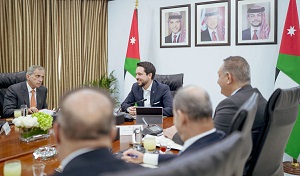 Crown Prince chairs meeting to review programme on combating littering
Crown Prince chairs meeting to review programme on combating littering
-
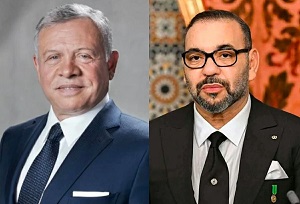 King congratulates Morocco monarch on football team’s 2025 Arab Cup win
King congratulates Morocco monarch on football team’s 2025 Arab Cup win
-
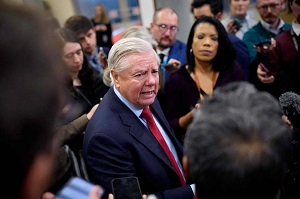 US Senator Accuses Hamas and Hezbollah of Rearming
US Senator Accuses Hamas and Hezbollah of Rearming
-
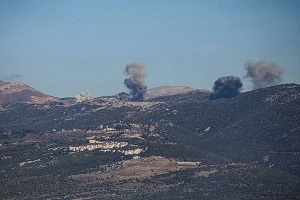 One Dead in Israeli Strikes on South Lebanon
One Dead in Israeli Strikes on South Lebanon
-
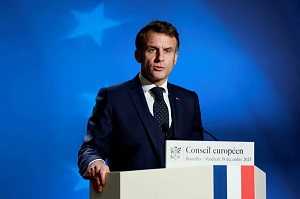 Putin Ready to Talk to France’s Macron on Ukraine, Says Spokesman
Putin Ready to Talk to France’s Macron on Ukraine, Says Spokesman